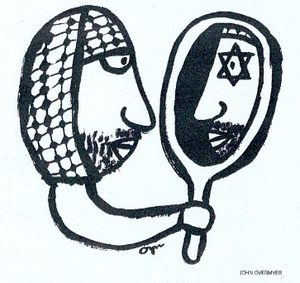Listen to the Palestinians talk about Jerusalem. These days, they sound a lot like Zionists.
First, there is one of Yasser Arafat's top religious officials declaring that the Palestinians "will never accept any piece of land as an alternative to Jerusalem." Then there is the "Jerusalem Pledge," signed by many Palestinian personalities, which promises "to God and to the Arab and Moslem states that Jerusalem will remain in our hearts, our feelings and our minds, and we will not cede its sand ... We pledge to God to remain holders of Jerusalem's flag until we hand it over to our children and our grandchildren."
On occasion, Palestinian words echo those of the Israelis. In fact, when Jewish and Moslem leaders met with Pope John Paul II in March, both claimed Jerusalem as their "eternal capital." Likewise, so did the Israeli president and Arafat. The Palestinian's love of Zion is not just talk - Arafat's demands for sovereignty over eastern Jerusalem led to the collapse of the Camp David II summit in July.
 Why do Palestinian feelings so closely resemble those of the Jews? Because Palestinian nationalism dates back only to 1920, and lacking prior roots, it imitates its Jewish counterpart.
Why do Palestinian feelings so closely resemble those of the Jews? Because Palestinian nationalism dates back only to 1920, and lacking prior roots, it imitates its Jewish counterpart.
For example, Zionists base their claims on the Bible; Palestinians do too. Arafat said to a journalist, "You must read the Bible, because it contains abundant historic references that demonstrate the existence of a cultural and geopolitical Palestinian identity for many thousands of years."
Likewise, just as Jewish Zionists created a "state in the making" during the Mandatory period (1917-48), so the Palestinians are doing so now. What the Jewish Agency was, the Palestinian Authority has become. This distinguishes these two movements from virtually all other anti-colonial efforts, which simply inherited the colonial state.
Moreover, the Jewish National Fund buys land from Arabs for Zionist settlement. Since 1995, the PLO has been in the business of buying land from Jews. The Zionist practice of planting trees has since 1994 also become a Palestinian practice. Both the JNF and the Palestinians have the same goal: to enhance a moral claim to the land. Further, the Palestinian planting takes place one day before Tu Bishvat, an ancient Jewish festival of trees.
The PLO's declaration of a Palestinian state in November 1988 echoed Israel's 1948 Proclamation of Independence in subject matter, organization, and even specific phrasing. David Ben-Gurion called on "the Jewish people all over the world to rally to our side." Arafat called on "Arab compatriots to consolidate and enhance the emergence and reality of our state."
The Law of Return holds that every Jew has an inalienable right to live in Israel and underpins the whole Zionist venture. Palestinians proclaim a "Right of Return," asserting that every displaced Palestinian has the prerogative to repossess lands left in 1948-49.
Also like Zionists, Palestinians rely heavily on foreign subventions. Zionists looked initially to fellow Jews for support, then to Western states. Palestinians also began by depending on co-religionists and then expanded to foreign governments.
Zionist terminology does double work for the Palestinians. The latter now call the land they seek "the promised land" and actually sometimes use the term "Eretz Palestine." Moslem thinkers are perfectly aware of this emulation. Sadik J. Azm, a Syrian analyst, calls Palestinian agencies "carbon copies" of their Zionist originals. Khalid Duran, a historian of Moroccan origin, finds that "the importance of Jerusalem to Jews and their attachment to it is now usurped by Palestinian Moslems." Kanan Makiya, an Iraqi writer, observes that "the hallowed status of Palestinian dispossession in 1948... has become for Arab politics what the Holocaust is for Israeli politics: mirror images of one another."
This game of Simon Says has two major consequences. First, it assures maximum conflict, for if something - Jerusalem, for instance - is intensely valuable to Jews, it must therefore be intensely valuable to Palestinians. Compromise would be much easier if, say, Ramle were the object of Palestinian ambitions.
Second, imitation turns every disagreement into a battle of wills. Who can plant more trees or raise more money abroad? Which side can make a more convincing case for its "return"? Who loves Zion more?
A combination of Palestinian vigor and Israeli fatigue make the answers anything but predictable. At this point, though seemingly unimaginable, Palestinian Zionism may be more vigorous than its Israeli prototype.
Aug, 30, 2000 addendum: This article builds on a longer analysis at "Mirror Image: How the PLO Mimics Zionism," National Interest, Fall 1994.